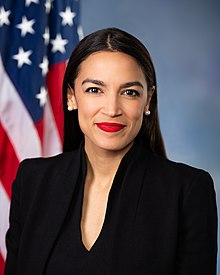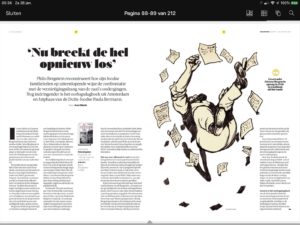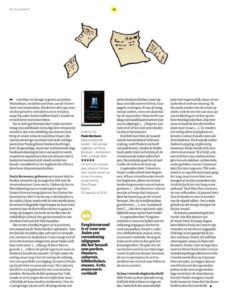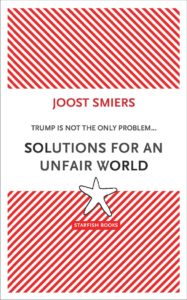Noam Chomsky: Ocasio-Cortez And Other Newcomers Are Rousing The Multitudes
A quick glance around the world today reveals that politics almost everywhere — from the federal government shutdown in the US to the power struggle in Venezuela and from Macron’s crisis in France and UK’s Brexit nightmare to the Israeli-Iranian rivalry – are engulfed in a state of uncertainty and turmoil. Meanwhile, oligarchy is replacing democracy as the widening social and economic gap between rich and poor continues unabated. So, who rules the world now? The US is in a state of relative decline, but neither Russia nor China has the capacity to control global developments. How do the super-rich and corporations factor into this equation? In this exclusive interview, world-renowned linguist and social critic Noam Chomsky provides penetrating insights into some of the most critical developments going on in the world today.
C.J. Polychroniou: After 35 days of a partial government shutdown, Trump signed a three-week funding bill but without securing money for the border wall. Leaving aside for the moment the surrealist nature of contemporary US political life, do you detect some hidden political strategy behind Trump’s funding conflict over the border wall with the Democrats?
Noam Chomsky: There’s a political strategy, but I’m not convinced that it’s hidden. With Trump, everything is pretty much on the surface. There have been constant efforts by political analysts to discern some deep geostrategic or sociopolitical thinking behind his performances, but they seem to me unconvincing. What he does seems readily explained simply on the well-grounded assumption that his doctrine is simple: ME!
Trump understands that he has a primary constituency — extreme wealth and corporate power — and that he has to serve its interests or he’s finished. That task has largely been assigned to the Ryans and McConnells, who have performed it admirably. Profits are skyrocketing, real wages are barely increasing despite low unemployment, regulations that might limit greed (and help mere people) are being dismantled, and the one legislative achievement — the tax scam — put lots of dollars in the right pockets and created a deficit that can be used as a pretext to undermine benefits. All is working smoothly — with analogues worldwide.
But Trump must maintain enough of a voting base to stay in power. That requires posturing as the defender of the ordinary guy against hated “elites” (always suppressing the true “masters of mankind,” to borrow Adam Smith’s phrase for the merchants and manufacturers who were “the principal architects” of policy). This act is helped along by such figures as Rush Limbaugh, who instructs his tens of millions of followers that they should beware of “the four corners of deceit: government, academia, science and media,” institutions that “are now corrupt and exist by virtue of deceit.” So, he argues, just listen to ME.
Meanwhile Trump must rise to the defense of the masses from awesome threats, chief among them now the hordes of “rapists,” “murderers” and “Islamic terrorists” he says are being mobilized down south to storm across the border and slaughter decent law-abiding white Christian Americans. We must therefore have a “beautiful wall” — which they will pay for. Trump promised that, and to back down would not only betray the trembling masses but also be a defeat, which his ego cannot tolerate.
The game is not really new. After all, the revered Ronald Reagan bravely donned his cowboy uniform and declared a National Emergency to protect the country from the Nicaraguan army, supposedly poised to destroy us all only two days’ drive from Harlingen, Texas. Trump is only carrying it further, helped by the fading of such infantile notions as “truth” — or “false realities,” to borrow Jared Kushner’s innovation. Former Secretary of State Dean Acheson’s admonition that policymakers must be “clearer than truth” has long passed into obsolescence. They can do far better in the atmosphere of “alternative facts” for those liberated from the four pillars of deceit.
I doubt that there is any deeper political strategy.
Furthermore, such performances are rather natural, perhaps even necessary. As both parties have drifted to the right during the neoliberal assault on the population, the Democrats abandoned the working class and became pretty much what used to be called “moderate Republicans” (something that is beginning to change now in promising ways) while Republicans climbed so deeply into the pockets of the super-rich and corporate power that it became impossible for them to gain anywhere near enough votes on their actual policies. Antics of the Trump style fit the requirements, along with a variety of measures to suppress voting and increased reliance on the many regressive aspects of the constitutional system, which by now make it possible for a small minority of white Christian traditional rural older citizens to have effective control of the government. The tendency is increasing and may soon lead to a major political crisis since it is virtually ineradicable given the structure of the Senate, designed by the Framers so that the small states would ratify the mostly unpopular Federal Constitution. A topic for another day.
Responding to Alexandria Ocasio-Cortez’s call for measures to tackle climate change, press secretary Sarah Huckabee Sanders made the incredible statement that climate change should be left to God. Don’t you find it utterly mysterious and indeed dangerous that such thinking still prevails among US public officials in the 21st century? And, really, how well do you think that such messages resonate with the American public today?
Sanders’s insight is not new. She is in good company. After all, the former chair of the Senate Committee on Environment and Public Works, James Inhofe, condemned efforts to address global warming as sacrilege: “God’s still up there,” he proclaimed, and “the arrogance of people to think that we, human beings, would be able to change what He is doing in the climate is to me outrageous.” It seems to work, at least in Oklahoma, where the senior senator has been in office since 1994. Doubtless well beyond Oklahoma, in a society with fundamentalist religious commitments that are far beyond the norm.
Yes, mysterious and dangerous — as is the fact that half of Republicans deny that global warming is even taking place, and of the rest, barely more than half think that humans have some responsibility for it. But there’s good news too. Trump’s new acting administrator of the EPA, former coal industry lobbyist Andrew Wheeler, agrees that global warming is probably happening — a problem he considers to be an “eight or nine” on a one-to-10 scale of concern, he informed Congress at his confirmation hearings.
Venezuela seems to be in the throes of a civil war. The US backs Juan Guaidó as interim president, in turn forcing Nicolás Maduro to consider expelling US diplomats, a decision he eventually backed away from, all while the leaders of China, Russia and Turkey slam Trump’s stance in Venezuela. First, what’s your assessment of what’s happening in Venezuela, and, second, why is it that much of the left worldwide continues to support Maduro when it is obvious that he has been a complete disaster?
Maduro has been a disaster, and the best the opposition has to offer is the self-declared President Juan Guaidó. About him little is known, apart from his great admiration for the neo-fascist Brazilian president Jair Bolsonaro, whom Guaidó praised for his commitment to “democracy [and] human rights,” as illustrated, for example, by his criticism of Brazil’s military dictatorship — because it … didn’t murder 30,000 people as in neighboring Argentina, the worst of the vicious military dictatorships that swept across South America from the ‘60s.
The roots of the Venezuelan disaster go back to failures of the Chavez administration, including its failure to diversify the economy, which is still almost entirely reliant on oil export. Venezuelan opposition economist Francisco Rodríguez, former chief Andean economist for the Bank of America, notes the failure of the government to set aside reserves during the period of high oil prices so it was at the mercy of international financial markets when prices dropped sharply in 2014 — and has been blocked from access to credit by harsh US sanctions, which have exacerbated the effects of what Rodríguez describes as the “atrocious” mismanagement of the economy under Maduro. Writing in Foreign Policy, Rodríguez observes that the policy of “Starving the Venezuelan economy of its foreign currency earnings risks turning the country’s current humanitarian crisis into a full-blown humanitarian catastrophe.” Arguably that is the purpose, following the Nixon-Kissinger script of “making the economy scream” to undermine the Allende regime. (That was the soft track; the hard track, soon implemented, was brutal military dictatorship.)
The drift toward civil war, with outside interference, is all too apparent. There is still room for negotiations among the contending parties, but it diminishes daily as the crisis deepens. Maduro is digging and Washington is intensifying its intervention, imposing new sanctions and selecting the egregious Elliott Abrams to join Bolton and Pompeo in what has been called “Trump’s axis of evil.” If skeletons can shudder, many must be doing so in the Central American countries that Abrams helped to ravage during Reagan’s terrorist wars.
Israel and Iran seem to be moving ever further closer toward a full-blown war. Why are they clashing in Syria?
Iran joined Russia in ensuring Assad’s victory in Syria, along with Iran’s Lebanese ally Hezbollah. Israel has been bombing Syria regularly. Four months ago the IDF reported over 200 strikes against Iranian targets since 2017, and they have been increasing since.
Israel, of course, has overwhelming military dominance in the Middle East, even apart from its close alliance with the US, which lavishly funds its military with the most advanced weapons in the US arsenal and even uses Israel to pre-position US weapons. And, of course, Israel is the region’s sole nuclear power, the reason why Washington has regularly blocked international efforts, led by the Arab states and Iran, to establish a nuclear weapons-free zone (furthermore, WMD-free) in the Middle East. That would end any imagined Iran nuclear threat, but it is unacceptable because the primary US client state in the region would have to open its nuclear arsenal to inspection, and those who regard US law as having some force would have to stanch the flood of military support for Israel.
Iran is not under US control and is therefore an enemy. Furthermore, the US and Israel recognize that Iran is a deterrent to their free resort to force in the region. The same is true of Hezbollah, whose Iranian-supplied missiles target large parts of Israel. The US and Israel have been threatening to attack Iran for years (“all options are open”) in radical violation of the UN Charter (hence the US Constitution), but that is a matter of no concern for lawless states with overwhelming power. And Trump has, of course, escalated the confrontation by withdrawing from the Iran nuclear agreement. An actual invasion of Iran would be too costly and dangerous, but the US-Israel might consider attacking from a distance after somehow neutralizing Hezbollah (which would mean destroying much of Lebanon). The consequences could be devastating.
In Davos, the multibillionaires expressed annoyance at and even fear of the presence of radical Democrats in the US Congress and their talk of “soaking the rich” on taxes. Has a global financial oligarchy replaced democracy in today’s advanced capitalist world?
It’s impossible to replace something that has never really existed, but it’s true that the partial democracies of the West have been undermined further by the financialization of the international economy during the neoliberal years. That’s a large part of the reason for the bitterness, anger and resentment, mislabeled “populism,” that is shaking the foundations of the western democracies, where the centrist political parties that have run the political system are crumbling in election after election.
Many analysts have to account for the rise of such “populism” throughout the neoliberal capitalist world on the basis of psychic disorders — in one respected version, impulses “deep in our psyches and bodies beyond matters of fact: physical pain, fear of the future, a sense of our own mortality.” It is, however, not really necessary to appeal to an epidemic of irrationality and “emotional appeals” somehow spreading over the domains subjected to the neoliberal assault of the past generation, including the enormous growth of largely predatory financial institutions with its deleterious impact on democratic systems of governance.
Fear that the “rascal multitude” will threaten the property of the self-designated “men of best quality” traces back to the first modern democratic revolution in 17th century England, and was a major concern of the framers of the US Constitution in its successor a century later. It reappears constantly when there is even a minor threat to overwhelming power, as in the famous Powell memorandum of 1971, which warned that the world is practically coming to an end because of the slight infringement on overwhelming business domination of the society. The influential manifesto, sent to the US Chamber of Commerce, helped set off the harsh counterattack in the years since.
It’s not surprising that these fears are surfacing in Davos as a few young Democratic representatives are arousing the rascal multitude again.
For many years, a considerable majority of the US population has favored higher taxes on the rich, while they regularly decline. And now, a few recently elected members of Congress are advocating what the public wants, most vocally Alexandria Ocasio-Cortez, who even went so far as to suggest tax rates at a level regarded as optimal for the economy by the most prominent specialists (Nobel laureate Peter Diamond, Emmanuel Saez, among others). Scandalous indeed.
What else can one expect when 26 people now have as much wealth as half the world’s population, according to the latest of the regular Oxfam reports on inequality?
No wonder the “masters of mankind” are trembling.
—
C.J. Polychroniou is a political economist/political scientist who has taught and worked in universities and research centers in Europe and the United States. His main research interests are in European economic integration, globalization, the political economy of the United States and the deconstruction of neoliberalism’s politico-economic project. He is a regular contributor to Truthout as well as a member of Truthout’s Public Intellectual Project. He has published several books and his articles have appeared in a variety of journals, magazines, newspapers and popular news websites. Many of his publications have been translated into several foreign languages, including Croatian, French, Greek, Italian, Portuguese, Spanish and Turkish. He is the author of Optimism Over Despair: Noam Chomsky On Capitalism, Empire, and Social Change, an anthology of interviews with Chomsky originally published at Truthout and collected by Haymarket Books.
Previously published: https://truthout.org/





